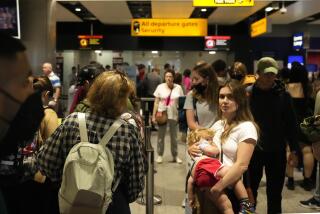Fear of Flying Shows Healthy Sense of Risk
- Share via
In ancient days one of the five pillars of Islam--fasting--was suspended for the faithful who were traveling. It was a recognition that travel was an arduous and perilous affair that required lone travelers to have all their wits and strength about them.
Today, with Muzak filling the air and smiling flight attendants easing passengers into their seats, we have lost the sense of flying --the world’s chief mode of long-distance transport--as a venturing forth replete with risks.
The only residue that airlines have not been able to expunge from the dreamlike state of flying is jet lag. Frequent travelers will tell you that the disorientation that they experience after a journey by plane is the mind’s natural reaction to an unnaturally rapid change of place. As novelists, poets and shamans have been telling us for centuries, there is indeed such a thing as spirit of place, and jumping from one place to another requires a certain adjustment of our own spirit as well. There may be an ideal rate of time at which a change of place can be assimilated, but it is not 550 miles per hour.
Airlines do their best to blunt passengers’ consciousness by pushing soporifics like alcohol. And many of the passengers would just as soon travel zonked. “No, I’m not afraid,” a colleague says. “I pray on the way up, and have two stiff drinks in the air. Then I pray again on the way down. Why should I be afraid?”
But all this I now see as a denial of a real and necessary fear of flying. After years of placing something close to blind faith in the safety of airline travel, understanding that the technology is as mortal as we are is the first step toward developing a very sane respect for travel by air.
These ruminations come from a love of flying, not a life of terror in the face of travel and planes. I have traveled quite a lot--in recent years as a journalist to at least 74 countries. Before that I was an airline stewardess. I left off composing an essay for NASA’s Journalist in Space competition only when I found out that I was pregnant. My baby traveled 15,000 air miles before she was even born.
My fear factor first began to rise when I became a parent and had to consider responsibilities toward someone besides myself. Yet, over time, I have also developed the kind of awe of air travel that I now regard as a constructive fear of flying.
I can measure this in concrete ways. Last-minute schedule changes or deliberate overbooking by an airline still make me irate, but it has been a long time since I have complained about delays due to maintenance. I find that my wrath is no longer directed at long lines in front of X-ray machines but rather at guards who flirt and gossip when they should be examining screens and handbags.
I still hold a deep anger at President Reagan for firing 11,000 air-traffic controllers.
And, like some other travelers whom I know, I am more familiar with the reported quirks of cargo doors and engines on ill-fated flights than I am with the workings of household appliances. I read every line of stories about flight disasters, and even near-collisions, before I read anything else in the papers.
Unconsciously, I suspect, I am searching for clues and information that might protect me.
Beyond a certain point, air passengers are not in control of their journeys, of course. But paying attention to technology, safety and the politics that affect air travel is the only recourse to flying blind--the only way to keep faculties sharp during the modern-day pilgrimages that I make for work, rest or visits to the family. Some day it may help me make a decision that will save my life.
Or it might not. No special vigilance by passengers would have prevented the crash of Northwest Flight 255. Maybe that is why I read that story so avidly, with a sense of horror--perhaps out of all proportion to the statistics of the event, given the excellent safety record of U.S. airlines.
In the end, as our ancestors understood better than we do, travel is still a risk. The passengers of Flight 255 took it and lost. News of their tragedy reconnects us to that older respect for travel, no matter how effortless our mode of movement seems. And that is not such a bad thing.
More to Read
Sign up for The Wild
We’ll help you find the best places to hike, bike and run, as well as the perfect silent spots for meditation and yoga.
You may occasionally receive promotional content from the Los Angeles Times.






